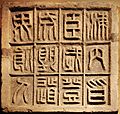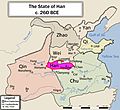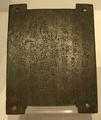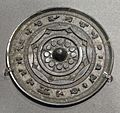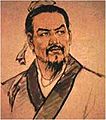Legalism (Chinese philosophy) facts for kids
Legalism (which in Chinese is called Fajia) is one of the main ways of thinking in ancient Chinese philosophy. It was listed by a historian named Sima Tan as one of the "six schools of thought."
This way of thinking focuses on what works best in real life, especially for governing a country. It doesn't spend much time on questions about right and wrong or how people should be good. Instead, it's all about making strong laws and having a powerful government. Some people compare it to ideas like Realpolitik (which means politics based on what's practical, not on ideals) and the ideas of Machiavelli, who wrote about how rulers can gain and keep power.
Legalism has influenced other important Chinese philosophies like Taoism and Confucianism. Even today, some of its ideas still affect how people think about government and law.
One of the most important thinkers behind Legalism was Shang Yang (who lived from 390 to 338 BC). He was a big reformer in his time, and his ideas helped shape what Legalism became.
Contents
What is Legalism?
Legalism is a Chinese philosophy that believes in a very strong government and strict laws. Unlike other philosophies that focused on kindness or tradition, Legalists thought that clear laws and harsh punishments were the best way to keep order and make a country powerful. They believed that people are naturally selfish, so they need strong rules to make them behave well.
Key Ideas of Legalism
Legalists had several main ideas about how a country should be run. They believed that laws should be very clear and apply to everyone, no matter if they were rich or poor, or if they were nobles or common people.
Laws and Punishment
The Legalists thought that laws should be written down and known by everyone. They also believed that punishments for breaking laws should be very strict. This was meant to scare people into following the rules. They also believed in rewards for those who did good things for the state, like being brave in battle or working hard.
A Strong Ruler
Legalism also emphasized the need for a strong and central ruler. This ruler would have absolute power and would be the one to create and enforce the laws. The ruler's job was to make the country rich and powerful, often through farming and military strength.
Focus on Practicality
Legalists were very practical. They didn't think much about old traditions or moral teachings. Instead, they focused on what would actually work to make the state strong and stable. They believed that things like art, music, or even too much learning could distract people from their duties to the state.
Important Legalist Thinkers
While Shang Yang was a very early and important Legalist, other thinkers also developed these ideas.
Shang Yang's Reforms
Shang Yang was a statesman who served the state of Qin. He introduced many reforms based on Legalist ideas. He made laws that were fair for everyone, no matter their social class. He also encouraged farming and military service, and he weakened the power of the old noble families. These changes helped the Qin state become very strong.
Han Fei and Li Si
Two other famous Legalist thinkers were Han Fei and Li Si. Han Fei was a prince who wrote many essays explaining Legalist ideas. He believed that a ruler should use both laws and clever tactics to control their officials and people.
Li Si was a student of Han Fei and became a powerful minister in the Qin Dynasty. He helped Qin Shi Huang, the First Emperor of China, unify the country using Legalist principles. Li Si helped create a strong, centralized government and standardized many things across the empire, like writing and measurements.
Legalism's Influence on the Qin Dynasty
Legalism had its biggest impact on the Qin Dynasty (221–206 BC). The Qin state adopted Legalist ideas and became incredibly powerful.
Unifying China
The First Emperor, Qin Shi Huang, used Legalist principles to conquer all the other warring states and unite China for the first time. He created a very strong central government, built roads, and standardized currency and writing.
The Downfall of Qin
However, the Qin Dynasty's rule was very harsh. The strict laws and severe punishments made many people unhappy. After Qin Shi Huang died, the dynasty quickly fell apart because of rebellions. This showed that while Legalism could make a state powerful, its extreme methods could also lead to its downfall.
Legalism Today
Even though the Qin Dynasty ended quickly, Legalist ideas didn't completely disappear. Some of its principles, like the importance of a strong central government and clear laws, continued to influence Chinese politics and law throughout history. It reminds us that different ideas about how to govern a country can have very different results.
Images for kids
-
Between Mozi's background as an engineer and his pacifist leanings, the Mohists became experts at building fortifications and sieges.
-
Small seal scripts were standardized by Li Si after the First Emperor of China gained control of the country, evolving from the larger seal scripts of previous dynasties. The 12 characters on this slab of floor brick affirm that it is an auspicious moment for the First Emperor to ascend the throne, as the country is united and no men will be dying along the road.
-
The people of Qi have a saying – "A man may have wisdom and discernment, but that is not like embracing the favourable opportunity. A man may have instruments of husbandry, but that is not like waiting for the farming seasons." Mencius
-
"If one has regulations based on objective standards and criteria and apply these to the mass of ministers, then that ruler cannot be duped by cunning fraudulence." —Han Fei
-
A modern marble statue of the first Emperor of China, Qin Shi Huang
See also
 In Spanish: Legalismo (filosofía china) para niños
In Spanish: Legalismo (filosofía china) para niños
 | Delilah Pierce |
 | Gordon Parks |
 | Augusta Savage |
 | Charles Ethan Porter |



